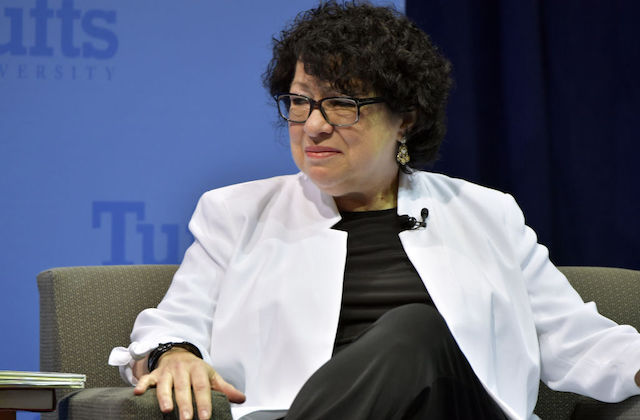Sonia Sotomayor Dissents in SCOTUS Decision to Allow Trump Admin to Target Low-Income Earning Immigrants

The Supreme Court of the United States on February 21 gave the Trump administration permission to impose harsh changes to the Inadmissibility on Public Charge Grounds immigration policy, also known as the public charge rule. The vote was 5 to 4, with conservative justices in the majority. Justice Sonia Sotomayor wrote what The New York Times called a “scathing” dissent, in which she said the Trump administration has been relying on the Supreme Court to grant a stay when lower courts will not. From the dissenting opinion:
Claiming one emergency after another, the government has recently sought stays in an unprecedented number of cases, demanding immediate attention and consuming limited court resources in each. And with each successive application, of course, its cries of urgency ring increasingly hollow.
[...]
Today’s decision follows a now-familiar pattern. The government seeks emergency relief from this court, asking it to grant a stay where two lower courts have not. The government insists—even though review in a court of appeals is imminent—that it will suffer irreparable harm if this court does not grant a stay. And the Court yields.
The updated public charge rule allows the Trump administration to punish immigrants who have applied for government services including Medicaid, the Supplemental Nutrition Assistance Program and housing assistance by denying them a green card or a path to legal permanent residency. As Colorlines previously reported, the Supreme Court on January 27 voted 5 to 4 on a similar case that came from U.S. District Judge George Daniels of New York and involved a nationwide injunction. The order on Friday lifted a limited injunction that only applied to Illinois.
As The Times reports, Sotomayor wrote in her dissent that the earlier case “at least had the virtue of blocking a nationwide injunction, a form of relief that has been criticized by judges and scholars.” The Friday case, however, goes against the driving argument of the earlier case. Sotomayor wrote:
Having first sought a stay in the New York cases based, in large part, on the purported harm created by a nationwide injunction, it now disclaims that rationale and insists that the harm is its temporary inability to enforce its goals in one state.
Sotomayor then slammed the conservative members of the Court. “It is hard to say,” she wrote in her dissent, “what is more troubling: that the government would seek this extraordinary relief seemingly as a matter of course, or that the court would grant it.” She said that the Supreme Court is “too quick to grant the government’s ‘reflexiv[e]’ requests.”
“Stay applications,” she wrote, “force the Court to consider important statutory and constitutional questions that have not been ventilated fully in the lower courts.” These stay applications “upend the normal appellate process, putting a thumb on the scale in favor” of the Trump administration, Sotomayor wrote.
Sotomayor added that this president and his administration have been treated better by the Supreme Court than death row inmates looking for stays of executions. She closed her dissent by writing: "I fear that this disparity in treatment erodes the fair and balanced decision making process that this Court must strive to protect."
